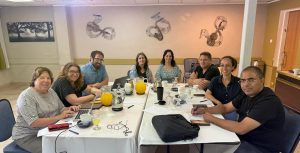On Tuesday, July 29, 2025, in Neve Ilan, the Israeli team of the Volcanic Project convened to mark 17 months of activity. After a year of running six academic courses and one teachers’ training course the team has amassed a substantial body of insights and achievements.

In Israel, courses were offered at several institutions:
- Sapir College: “Artificial Intelligence and Big Data”, “Camera Make a Change”, and “R&D and Product Management”.
- Kaye Academic College: “My Toolbox: Digital Tools for Educators”, “Planning and Designing Project-Based Learning in an Integrative STEM Approach”, and “Digital World in Early Childhood”.
- The teachers’ training course was offered At the Center for Professional Development in the Bedouin Community: Enhancing Teaching through Artificial Intelligence (teachers’ training course).
Lecturers shared challenges faced during the Volcanic courses. These included technological communication gaps among students in remote areas where many Bedouin students live; tensions between traditional values of modesty and privacy (especially for women) and the necessary exposure involved in online platforms such as Zoom and Teams; lack of a quiet study space at home for some students; and language barriers that slowed academic progress.
Discussion linked these obstacles to effective pedagogical strategies that proved effective in the field such as: understanding of cultural contexts, connecting assignments to real-world experiences, using face to face communication mode rather than online learning when possible and foster critical thinking and creativity while respecting cultural sensitivities.
The team is now preparing a document summarizing key insights and recommended practices for teaching Bedouin students. This resource will make the project’s knowledge and experience accessible to educators and pedagogical trainers.
A significant part of the meeting focused on building collaborations with organizations and stakeholders from the Bedouin community, aiming to extend the project’s impact beyond academic settings and into daily community life.
The meeting also reviewed the accompanying evaluation, designed to assess the courses’ effects on attitudes (concepts), skills, and achievements—using both quantitative methods (surveys) and qualitative methods (interviews, content analysis). It is expected that this study will provide a comprehensive framework for evaluating the Volcanic Project’s pedagogical approach in supporting disadvantaged populations’ technological and academic skills.
Far from being merely a pause for reflection, the meeting served as a catalyst. The insights, exchanges, and connections forged will continue to drive field activities, advance educational innovation, and expand the project’s reach.

